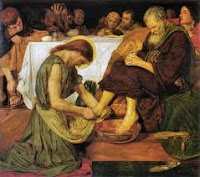 ..
..We are all familiar with the story of the Annunciation from Luke (Lk 1:26 – 38) in which the angel Gabriel appears to Mary who says, “Behold the handmaid of the Lord, let it be done to me as you have said.”
THE ANNUNCIATION: A LUCAN STORY
Only St. Luke would have thought to tell the story of the annunciation in just this way. He loves to give major roles to minorities (such as women) and outcasts, he emphasizes Jesus’ humble origins, and enjoys pointing out the law of divine reversal (whereby the rich become poor and the poor rich, etc.). These themes give us some new perspectives on the story of the annunciation.
In Ch. 1:5-25, Luke tells the story of the announcement of the birth of John the Baptist: an angel appears to the priest Zechariah as he is performing his duties in the temple. This story provides a contrast with the next one, the announcement of the birth of Christ, in which an angel appears to a young girl.
In contrast to Zechariah, Mary holds no official position among the people,
She is not described as “righteous” in terms of observing Torah,
She is among the most powerless people in her society:
- she is young in a world that values age,
- she is female in a world ruled by men,
- she is poor in a stratified economy.
Furthermore she has neither husband nor child to validate her existence.
Yet she has “found favor with God” and has been “highly gifted.”
Here we one of Luke's favorite themes: God acting in ways that are surprising and paradoxical, reversing human expectations.
Finally, Luke prizes simplicity and humility; thus the most important dialogue in the whole bible, ending with Mary’s telling the angel, “Let it be done to me,” does not take place in the temple (as Zechariah’s vision does), nor in a royal palace, but rather in the obscure village of Nazareth.
FR. KILIAN'S POEM
Father Kilian McDonnell, O.S.B., a monk of St. John’s Abbey in Minnesota, wrote a lovely reflection on this very theme. I offer it here as a reminder that we should be ready to encounter God at any time, anywhere, especially in our everyday activities. But before reading it, first take a look at Jacopo Bellini's 1444 painting, referred to in the first stanza.
.
 |
Jacopo Bellini, Annunciation, 1444 |
.................
........................Bellini has it wrong.
........................I was not kneeling
........................quietly at prayer, ..........................
........................head slightly bent
........................to show submission.
.....................
........................Painters always
........................get it wrong, skewed,
........................as though my life
........................were wrapped in the silks,
........................in temple smells.
........................Actually I had just
........................come back from the well,
........................pitcher in my hand.
........................As I placed it on the table
........................I spilled some on the floor.

........................Bending to wipe
........................it up, there was a light,
........................against the kitchen wall
........................as though someone had
........................opened the door to the
..........................................................sun.
..........................
........................Rag in hand,
........................hair across my face,
........................I turned to see
........................who was coming in,
........................unannounced, unasked.
..........................
All I saw
........................was light, whiter
........................than whitest white.
........................I heard a voice
........................I had never heard,
........................walking toward me,
........................saying I was chosen,
........................The Favored One.
........................ I pushed back my hair,
..........................stood baffled.
..........................With the clarity of light
..........................the light spoke
..........................of Spirit, shadow, child
..........................as the water puddled
..........................large around my feet.
..........................Against all reason,
..........................against all rationality,
..........................I knew it would be true.
..........................I heard my voice
..........................“I have no man.”
..........................The Lord is God
..........................of all possibilities:
..........................with Elizabeth no flow
..........................of blood in thirty years
..........................but six months gone.
..........................From the fifteen years
..........................of my Nazareth wisdom
..........................I spoke to the light
..........................in the joy of truth:
..........................“Let it be so.”
..........................Someone closed the door.
..........................And I dropped the rag.
























